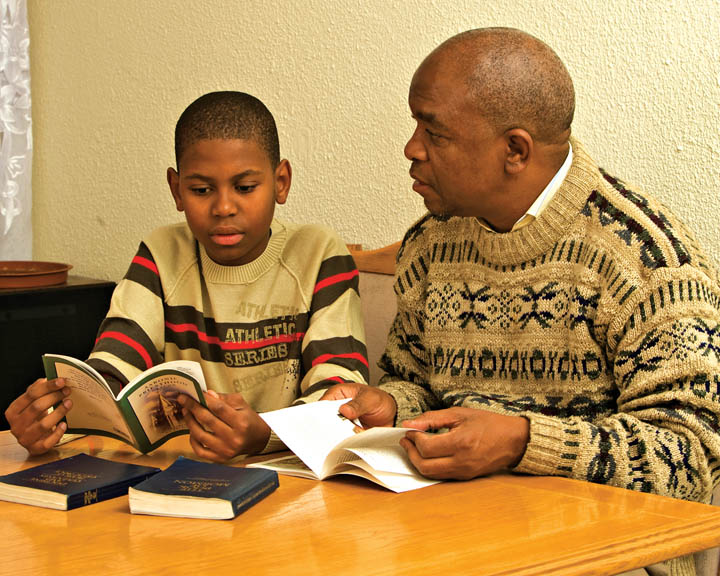By Doris
With the so-called “Mormon Moment” having taken center stage for such a length of time in the media, it’s hard to imagine anyone left in the United States who has not heard of a Mormon. Yet, many people are still mixed up about what exactly a Mormon is. What is a Mormon?
 First off, “Mormons” do not refer to themselves as “Mormon.” They are Latter-day Saints. They are members of The Church of Jesus Christ of Latter-day Saints. However, the media constantly confuses this name and misnames the church the “Mormon Church.” This causes many people who are not familiar with the faith to think of Latter-day Saints as “Mormons.” The confusion extends so far that some people actually think Mormons and Latter-day Saints are followers of two different religions.
First off, “Mormons” do not refer to themselves as “Mormon.” They are Latter-day Saints. They are members of The Church of Jesus Christ of Latter-day Saints. However, the media constantly confuses this name and misnames the church the “Mormon Church.” This causes many people who are not familiar with the faith to think of Latter-day Saints as “Mormons.” The confusion extends so far that some people actually think Mormons and Latter-day Saints are followers of two different religions.
The misnomer “Mormon” comes from an ancient prophet who lived in the Americas. He and many other ancient prophets kept faithful records of their history (which began in Jerusalem), their flight to the Promised Land, and their dealings with Jesus Christ. This record was eventually buried in order to prevent its destruction by these people’s enemies. Mormon was the name of the prophet who abridged the record which spanned about 1,000 years. He gave this record to his son, Moroni, who was the last surviving, righteous man of their people. Moroni added to the record and eventually buried it. Moroni returned 1,200 years later, as an angel, to show Joseph Smith, a man who was called to restore the fulness of the gospel of Jesus Christ to the earth, where this record was buried. Joseph then translated this record by the power of God and it was published as the Book of Mormon. Because Latter-day Saints believe the Book of Mormon to be inspired scripture and a companion book of scripture to the Bible, many people began calling them Mormons. The name has stuck, but unfortunately brings many misconceptions with it.
One of the most troubling misconceptions about Latter-day Saints (“Mormons”) today is that they practice polygamy. While Mormon polygamy was practiced in the early days of The Church of Jesus Christ of Latter-day Saints, it has not been practiced for more than 100 years. There are many splinter groups who call themselves “Mormons” who do practice polygamy. Since the media continues to refer to Latter-day Saints as “Mormons,” it has become very difficult to distinguish which “Mormons” believe and practice what.
Now, Mormon doctrine does not say that polygamy was wrong when it was practiced. It was a commandment from God that most people were not keen on living. In fact, only a very small percentage of church membership ever did practice polygamy. Among those who did, each polygamous marriage had to be approved by church leaders. No one was ever forced into a polygamous marriage, and all members of the marriage had to agree when a new wife came in. Women who found themselves unhappy in a polygamous marriage were given the opportunity to divorce with no kind of punishment or penalty.
Many Mormon women actually found the circumstances liberating. Having more women to handle the demanding chores which life in an early settlement brought with it freed women to have more personal time. Some of them became involved in politics, some went back to school, some became doctors, some were just able to enjoy some more free time. Some found more protection under the arrangement as widows; they were given more rights and were taken care of. There is no recorded reason given for the early practice of polygamy. It was a commandment, and people obeyed, though sometimes reluctantly, and despite heavy persecution.
By 1890, many Saints had been stripped of their rights as citizens. Many had to flee with their families to escape physical harm. When God saw the condition and that His people were still willing to be obedient, He withdrew the commandment to live the law of polygamy. He did this in order to protect His people. In 1890, The Church of Jesus Christ of Latter-day Saints made it an excommunicable offense to enter into a new polygamous marriage. It has continued in that standing today. Any Latter-day Saint (“Mormon”) who enters into a polygamous marriage does so in direct violation of God’s law and will be excommunicated.
Those groups who call themselves “Mormon” and still practice polygamy today are not affiliated with The Church of Jesus Christ of Latter-day Saints.
So far, this article has touched on what Latter-day Saints (“Mormons”) aren’t. It is far more uplifting to discuss what Mormons are. Mormons believe in Jesus Christ. They do not worship anyone named Mormon, nor do they worship Joseph Smith. Mormons believe that Jesus Christ is the Son of God and the Redeemer of the world. God the Father is a tangible being who created each person as a spirit before that person came to this earth. We are His beloved children, and He earnestly desires our happiness.
 Mormon doctrine differs from traditional Christian doctrine in that it does not hold to the Christian creeds. These creeds were written hundreds of years after the death, resurrection, and ascension of Jesus Christ. After the apostles were martyred, the wickedness of powerful, scheming men in the Early Church changed the doctrine to fit in with the more popular philosophies of the time. They denied that God was a tangible being. They began to deny that Jesus Christ was the literal Son of God, instead claiming He was some other, incomprehensible manifestation of the same being.
Mormon doctrine differs from traditional Christian doctrine in that it does not hold to the Christian creeds. These creeds were written hundreds of years after the death, resurrection, and ascension of Jesus Christ. After the apostles were martyred, the wickedness of powerful, scheming men in the Early Church changed the doctrine to fit in with the more popular philosophies of the time. They denied that God was a tangible being. They began to deny that Jesus Christ was the literal Son of God, instead claiming He was some other, incomprehensible manifestation of the same being.
Latter-day Saints (“Mormons”) believe that Jesus Christ lives. He suffered and atoned for the sins of the world, He was crucified, and He rose on the third day from the tomb. He organized His church and then ascended into heaven. Mormons also believe that during this time, Christ spent time with His followers in the Americas. The Book of Mormon records His dealings with a people there, as well as His visitation after His resurrection. The Book of Mormon is another testament that Jesus is the Christ and that He is mindful of righteous followers everywhere.
Latter-day Saints do their best to live the gospel of Jesus Christ. They are taught to have charity (the pure love of Christ) and to build one another up. The commandments that God has given us are for our safety and happiness. It is only by following His commandments and applying the cleansing power of the atonement of Jesus Christ in our lives that we can return to live with God after this life.
For faithful Latter-day Saints, their religion is a way of life. It requires a great deal more than going to church once a week (or twice a year). When He was on the earth, Jesus Christ was very clear about the higher law that His followers are expected to live. They must set themselves apart from the cares and the temptations of the world and strive to be better people, more like Him.
Latter-day Saints also believe in eternal families. While civil marriages are unions for this life, until “death do you part,” Mormons believe that marriages performed in temples last for eternity, if both spouses keep the promises they make in that covenant. Another blessing is that any children born to them will also be sealed to them for eternity. Family relationships can extend beyond the grave.
The bottom line is that Mormons are not cultish people hiding out in colonies hoping to take over the world. They are normal people living trying to live their lives according to the gospel of Jesus Christ. They live in cities, towns, and villages across the world and band together in a community trying to help each other manage with the normal trials of life. They worship Jesus Christ as their Savior and are respectful of other people’s beliefs.
About Keith L. Brown
Keith L. Brown is a convert to The Church of Jesus Christ of Latter-day Saints, having been born and raised Baptist. He was studying to be a Baptist minister at the time of his conversion to the LDS faith. He was baptized on 10 March 1998 in Reykjavik, Iceland while serving on active duty in the United States Navy in Keflavic, Iceland. He currently serves as the First Assistant to the High Priest Group for the Annapolis, Maryland Ward. He is a 30-year honorably retired United States Navy Veteran.


 Watch a video about the restoration of the gospel on lds.org
Watch a video about the restoration of the gospel on lds.org